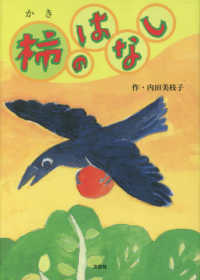- ホーム
- > 洋書
- > ドイツ書
- > Humanities, Arts & Music
- > Psychology
- > theoretical psychology
Full Description
This Handbook brings together an international cast of experts to explore the social nature and context of creativity studies, focusing on methodology as a key component in advancing the social study of creativity. Two decades on from the pioneering work of Alfonso Montuori and Ronald E. Purser, the authors present a timely appraisal of past and present work in social creativity studies, and look ahead to future developments within this field.
The authors collectively offer a rigorous examination of the methodological and empirical issues and techniques involved in studying social creativity. They examine the phenomenon as a form of communication and interaction within collaborative relationships; contending that creativity happens not within a vacuum but instead from a nexus of personal, social and contextual influences.
This comprehensive work is organized in three parts, focusing first on the various methodological approaches applicable to the social in creativity studies. It secondly turns to empirical findings and approaches relating to the social nature of creativity. In the book's final part, the authors offer reflections on the state of social research into creativity, pinpointing areas requiring further methodological scrutiny and empirical verification, and areas that may inspire further theoretical or applied work. Combining classic ideas with cutting-edge, emerging methods, this work provides a vital methodological 'toolbox' for investigators within social creativity.
Contents
1. Re/searching the Social in Creativity, Past, Present and Future: An Introduction to the Palgrave Handbook of Social Creativity Research; Izabela Lebuda, Vlad Petre Glăveanu.- Part I Methodological approaches to the social in creativity studies.- 2. The Sociocultural Context of Exceptional Creativity: Historiometric Methods; Dean Keith Simonton.- 3. Assessing Creativity with the Consensual Assessment Technique; John Baer, James C. Kaufman.- 4. An Introduction to Social Network Analysis for Creativity Research; Alexander S. McKay.- 5. Those days when people are creative: Diary methods in creativity research; Marta Czerwonka.- 6. Imaginative play, socio-emotional competence, and sociometric status in preschool children: Common methodological problems and new directions in research; Dorota Maria Jankowska, Iwona Omelańczuk.- 7. Climate for creativity: How to measure it in parent - child relationships?; Joanna Maria Kwaśniewska.- 8. Life Positioning Analysis: Sociality, Materiality, and Creativity in the Lives of Carl Rogers and B. F. Skinner; Jack Martin.- 9. The dynamic display of social creativity: Developing the method of serial reproduction; Brady Wagoner.- 10. Microgenetic analysis and creativity: analyzing psychological change processes; Mônica Souza Neves-Pereira.- 11. Studying creativity as a social process: The use of subjective cameras; Vlad Petre Glăveanu.- Part II Empirical approaches to the social in creativity studies.- 12. The Sociocultural Context of Exceptional Creativity: Historiometric Studies; Dean Keith Simonton.- 13. (Social) Identity and Creativity in Virtual Settings: Review of Processes and Research Agenda; Jérôme Guegan, Todd Lubart, Julie Collange.- 14. The Role of Structure and Instruction on Creative Idea Evaluation and Selection; Roni Reiter-Palmon, Victoria Kennel, Triparna de Vreede, G. J. de Vreede.- 15. How do you manage evaluation? Attentive and affective constituents of creative performance under perceived frustration or success; Sergio Agnoli Laura Franchin, Enrico Rubaltelli, Giovanni Emanuele Corazza.- 16. Divergent and Convergent Collaborative Creativity; Paul B. Paulus, Lauren E. Coursey, Jared Kenworthy.- 17. The plasticity of natural concepts and creativity; Jerzy Trzebiński, Agnieszka Wołowicz.- 18. Lost in translation again: Concepts about creativity among Japanese and Polish prospective teachers; Aleksandra Gajda.- 19. Nomination of Domestic and Overseas Creative Celebrities: The German Style and the Factors behind it; Min Tang, Markus Moser.- 20. The Paul Gauguin Syndrome - A Great Life Change; Piotr K. Oleś.- 21. Changing one's foodway: Creativity as repositioning; Fabienne Gfeller.- 22. Behind the scenes: How to research creative processes in multidisciplinary groups; Ingunn Johanne Ness.- 23. Creative Culture Analysis: A way to understand how an environment is (or isn't) favorable to creative ideas; Asdrúbal Borges Formiga Sobrinho.- Part III. Reflections on social research into creativity.- 24. Evaluation of Creativity is Always Local; Robert J. Sternberg.- 25. Creating Social Creativity Integrative Transdisciplinarity and the Epistemology of Complexity; Alfonso Montuori.- 26. Creativity as dissent and resistance: Transformative approach premised on social justice agenda; Anna Stetsenko.- 27. Engineering moral autonomy: Creativity and innovation in the age of artificial intelligence; Daniel T. Gruner, Mihaly Csikszentmihalyi.- 28. Life in the Cyber-Physical Society: the Need for Organic Creativity; Giovanni Emanuele Corazza.- 29. From Static to Dynamic: Toward a Socio-Dynamic Perspective on Creativity in Classrooms; Ronald A. Beghetto.- 30. Classroom Creative Climate: From a Static to a Dynamic Perspective; Maciej Karwowski.- 31. Is Creativity Compatible with Educational Accountability? Promise and Pitfalls of Using Assessment to Monitor and Enhance a Complex Construct; Jonathan Plucker, Rasis Alanazi.- 32. A creative peer-to-peer methodology; Lene Tanggaard Pedersen, Charlotte Wegener.- 33. Creativity and the Social Brain; Anna Abraham.- 34. Social Innovation and the Evolution of Creative, Sustainable Worldviews; Liane Gabora, Mike Unrau.- 35. Fun, Foibles and Frustrations; Monika Reuter.- 36. Extraordinary: Reflections on Sample Representativeness; Viktor Dorfler, Marc Stierand.- 37. Why researches of professional and eminent creators' self beliefs need social context; Izabela Lebuda, Mihaly Csikszentmihalyi.







